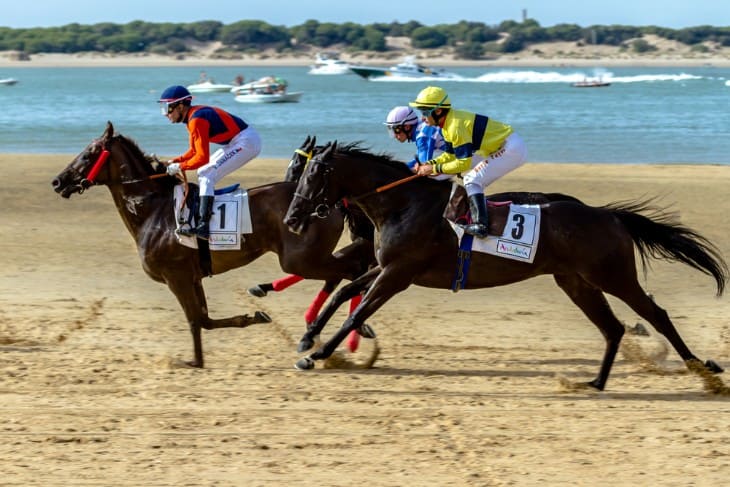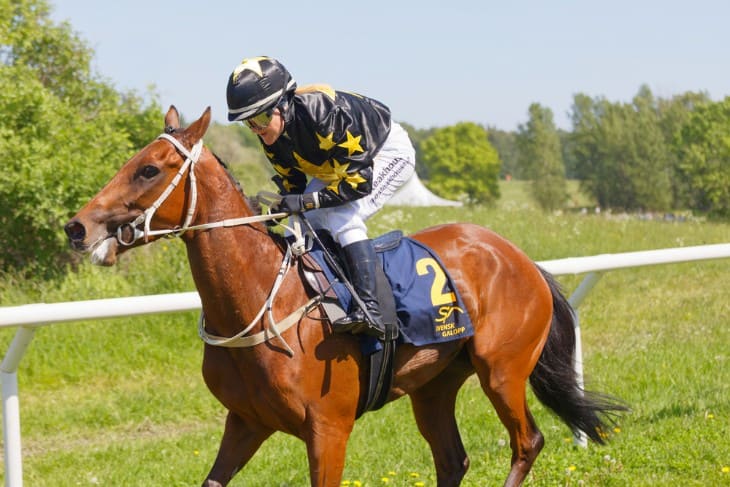Betting on the King George VI Chase can be an exciting and potentially profitable endeavour for horse racing enthusiasts. This prestigious steeplechase race, typically held on Boxing Day (December 26th) at Kempton Park Racecourse in England, attracts top-class horses and jockeys from around the world. Therefore, we bring you this short guide to help you make informed betting decisions on this event:
Understand the Race
By thoroughly understanding the race itself and the conditions surrounding it, you can make more informed betting decisions. Combine this knowledge with research on individual horses, jockeys, and trainers to increase your chances of success when betting on the King George VI Chase.
- Race History: The King George VI Chase has a rich history dating back to its inaugural running in 1937. Researching the history of the race can provide valuable insights. Look at past winners, their backgrounds, and whether there are any trends or patterns, such as certain trainers or jockeys who have a strong record in the race.
- Race Conditions: Familiarize yourself with the specific conditions of the King George VI Chase. This race is typically run at Kempton Park Racecourse in England over a distance of approximately 3 miles (4,828 meters). Understanding the track's characteristics, including its layout and any quirks, can help you assess which horses may be better suited to it.
- Grade and Class: The King George VI Chase is classified as a Grade 1 race, which is the highest level of National Hunt racing. This means it attracts top-quality horses, often with previous Grade 1 or Grade 2 success. Be aware of the class of horses that typically compete in this race and their previous accomplishments.
- Fences: The race features 18 fences, which can be a significant factor in determining the winner. Some horses are better jumpers than others, so analyze how well each entry has performed over fences in previous races.
- Weight Conditions: Check the weight conditions for the race. Some horses may carry more or less weight based on their previous performances. This can impact their chances, as some horses may find it more challenging to carry a heavier burden.
- Age and Experience: The King George VI Chase is open to horses aged four and older. While older horses may have more experience, younger ones can sometimes be more talented. Assess whether age and experience play a role in the race's outcome.
- Trends: Pay attention to any trends that have emerged in recent years. For example, some horses may perform better in certain conditions or under specific jockeys or trainers. Analyze whether any trends can help you identify potential winners.
- Course Preferences: Some horses may have a preference for the Kempton Park course. Check whether they have raced successfully at this track before or have struggled with it in the past.
- Distance Suitability: Consider whether the 3-mile distance of the race suits each horse's running style and previous performances over similar distances.
- Recent Winners: Look at the recent winners of the King George VI Chase and study their form leading up to the race. This can provide valuable insights into the types of horses that tend to perform well.
Research the Horses
By conducting thorough research on each horse and considering various factors, you can make more informed selections when betting on the King George VI Chase. Combining this horse-specific knowledge with an understanding of the race itself and other contextual factors will enhance your chances of making successful wagers.
Form and Recent Performances:
Start by examining each horse's recent form. This includes their last few races leading up to the King George VI Chase. Look for wins, placings, and any notable performances.
Pay attention to the type of races they've competed in. Horses that have been successful in similar Grade 1 or Grade 2 races may have a competitive edge.
Track Record:
Investigate how each horse has performed at Kempton Park Racecourse in the past. Some horses excel on this particular track, while others may struggle.
Consider whether a horse has previously won or placed in races at Kempton, especially over similar distances.
Distance Suitability:
Assess each horse's suitability for the 3-mile distance of the King George VI Chase. Some horses may have a history of strong performances at this distance, while others may excel at shorter or longer distances.
Look for horses with previous wins or top finishes in races of similar length.
Fence and Jumping Ability:
Since the King George VI Chase features 18 fences, a horse's jumping ability is critical. Review their past performances over fences and assess their proficiency in jumping.
Consider if any horse has a history of making costly jumping errors, as this can significantly impact their chances in the race.
Class and Grade of Competition:
Take note of the class and grade of races that each horse has been competing in. Horses that have consistently performed well in Grade 1 or Grade 2 races are more likely to handle the level of competition in the King George VI Chase.
Trainer and Jockey Combination:
Analyze the partnership between the trainer and jockey for each horse. Some trainers and jockeys have a strong rapport and tend to perform well together.
Research whether the jockey has previously won the King George VI Chase or other prestigious races.
Weight Conditions:
Check the assigned weights for each horse in the race. Heavier weights can be a disadvantage, so assess whether a horse is carrying more or less weight than usual and how it has handled similar weight conditions in the past.
Age and Experience:
Consider the age and experience of each horse. Older horses may have more experience but could be facing younger, potentially more talented competitors.
Evaluate whether age has played a significant role in past editions of the race.
Health and Fitness:
Keep an eye on any news or updates regarding the health and fitness of the horses. Injuries or recent illnesses can impact their performance.
Recent Workouts and Training:
Some bettors follow horses' recent workouts and training routines leading up to the race. A horse that has shown strong workouts may be in good form and ready to compete.
Stable and Ownership:
In some cases, the stable or ownership group behind a horse can provide insights. Certain stables may have a history of success in the King George VI Chase.
Betting Odds and Market Sentiment:
Keep an eye on the betting odds and market sentiment leading up to the race. Sudden shifts in odds can indicate where the money is going and which horses are considered favourites.

Consider the Jockeys
By evaluating the jockeys in the King George VI Chase, you can gain insights into their potential impact on the race's outcome and make more informed betting decisions. Let’s check some of the key aspects:
- Experience and Track Record: Assess jockeys' experience in big races and their track record at Kempton Park. Experienced jockeys with a history of success can make a significant difference.
- Previous King George VI Chase Performance: Research how each jockey has fared in previous editions of the race. A jockey's familiarity with the event can be advantageous.
- Partnership with Trainers: Consider the rapport between the jockey and the horse's trainer. Some combinations work exceptionally well together, which can boost a horse's chances.
- Recent Form: Analyze the jockey's recent form, including their win percentages and performance in recent races. Consistency can be a sign of a reliable jockey.
- Big Race Nerves: Assess how well a jockey handles the pressure of big races. Some jockeys excel in high-stakes events, while others may struggle with nerves.
- Tactics and Race Strategy: Research whether a jockey is known for making astute tactical decisions during races. Race strategy can play a critical role in the outcome.
- Ownership Connections: Occasionally, ownership connections can influence jockey selection. Certain owners have preferred jockeys who regularly ride their horses.
Evaluate the Trainers
Also, don’t forget to check the Trainer’s history:
- Track Record: Examine the trainer's history in the King George VI Chase and their overall performance in major National Hunt races. Some trainers specialize in preparing horses for specific events, including this prestigious steeplechase.
- Previous Success: Look at whether the trainer has previously won or placed horses in the King George VI Chase. Trainers with a history of success in this race may have a strategic advantage.
- Training Style: Consider the trainer's training style and methods. Some trainers are known for their ability to prepare horses for specific track conditions or distances.
- Horse-Specific Expertise: Evaluate whether the trainer has experience with the particular horse in question. A trainer who has successfully developed a horse's potential may have an edge.
- Stable Form: Analyze the current form of the trainer's stable. A stable that is performing well overall may indicate that the horses are in good condition and ready to compete.
- Jockey Partnerships: Examine the trainer's partnership with the jockey. Some trainers work closely with specific jockeys, and a strong partnership can enhance a horse's performance.
- Training Facilities: Assess the quality of the trainer's facilities. Well-equipped stables and training grounds can contribute to a horse's fitness and readiness for the race.
- Race Strategy: Consider the trainer's typical race strategy. Some trainers may instruct their jockeys to adopt specific tactics, such as front-running or holding back, based on their assessment of the competition.
- Horse Development: Research whether the trainer has a reputation for developing horses over time. Some trainers excel at improving a horse's abilities and stamina.
Study Track Conditions
Studying track conditions is critical when betting on the King George VI Chase, as it can significantly impact a horse's performance. Kempton Park Racecourse, where the race is held, can experience varying ground conditions. The track can be described as right-handed and flat, which generally suits horses with a specific running style. Understanding how horses perform on different ground types is essential. Some may excel on firm ground, while others prefer it softer. The wet or heavy ground can favour horses with stamina and jumping ability, as it often becomes more demanding.
Monitoring weather forecasts in the days leading up to the race is crucial. Rainfall or changes in temperature can quickly alter track conditions. Additionally, assess how each horse has performed on similar track surfaces in the past. Horses with a proven track record on the expected ground conditions at Kempton may have an advantage. In essence, being prepared for various track conditions and considering how they align with each horse's strengths can help you make informed betting decisions for the King George VI Chase.
Analyze Recent Form
Analyzing a horse's recent form is a fundamental aspect of handicapping for the King George VI Chase. It involves scrutinizing the horse's performance in its most recent races leading up to the event. Look beyond just wins and losses; delve into the specifics of each race, such as the quality of the competition, the distance, and how the horse fared under similar track conditions. Consistency in recent form is often a good indicator of a horse's fitness and competitive readiness.
Pay particular attention to the horse's most recent races, as these tend to be the best indicators of its current condition. If a horse has shown improvement or a string of strong performances, it may be in peak form. Conversely, if it has been consistently underperforming or has had issues in recent races, it may not be a strong contender for the King George VI Chase. Combining recent form analysis with other factors like track conditions, jockey partnerships, and trainer expertise can help you make well-informed betting decisions and identify horses with a higher likelihood of success in the race.
Watch for Market Trends
Watching for market trends is a key aspect of successful betting on the King George VI Chase. The betting markets can provide valuable insights into the collective opinion of both experts and the general betting public. Pay attention to significant shifts in odds or sudden movements in the betting markets, as they can indicate where the money is flowing and which horses are considered favourites. Keep an eye out for insider knowledge or informed opinions that might drive these shifts.
However, exercise caution and consider whether such trends align with your own analysis and research, as betting markets can sometimes be influenced by hype or sentiment. Combining your own insights with market trends can help you make more informed and strategic betting decisions for the race.
Set a Budget
Setting a budget is a fundamental principle of responsible betting on the King George VI Chase or any horse racing event. It involves determining how much money you are willing and able to allocate for betting on the race, and it helps you avoid risking more than you can afford to lose. Start by assessing your financial situation and establishing a dedicated betting bankroll. Be disciplined and stick to your predetermined budget, regardless of the outcome of your bets.
Betting can be unpredictable, and it's essential to separate your wagering funds from your essential expenses. By setting a budget, you ensure that your betting activities remain enjoyable and within your means, minimizing the risk of financial strain or compulsive gambling behaviours.
Bet Types
When betting on the King George VI Chase, consider your risk tolerance, knowledge of the horses and jockeys, and the potential payout you're aiming for when choosing your bet type. Different bet types offer varying levels of complexity and potential returns, so make your selections wisely based on your analysis and strategy.

- Win Bet: This is a straightforward bet where you select one horse to win the race. You only collect if your chosen horse finishes first.
- Place Bet: With a place bet, your selected horse must finish in the top two (sometimes top three, depending on the race) for you to win. The odds are typically lower than for a win bet, but it offers a better chance of winning.
- Each-Way Bet: This is a combination of a win and a place bet. You wager on a horse to both win and place. If the horse wins, you receive both the win and place payouts. If it places but doesn't win, you still collect a portion of the bet.
- Exacta: In an exacta bet, you select two horses to finish first and second in the exact order. It's a more challenging bet than win or place but offers higher potential payouts.
- Trifecta: Similar to the exacta, but you pick three horses to finish in first, second, and third place in the precise order. It's even more challenging but can result in substantial payouts.
- Superfecta: This bet requires you to pick four horses to finish in the top four positions in the exact order. It's a difficult bet to win but can lead to significant rewards.
- Forecast Bet: A forecast bet involves predicting the first and second-place finishers in the correct order, typically in races with large fields.
- Combination Bets: These are bets where you select multiple horses in various combinations. For example, a "box" exacta bet covers all possible combinations of your chosen horses, increasing your chances of winning.
- Placepot/Pick 6: These are pool bets where you aim to pick a horse to place in each of the first six races on a racecard. If all your selections place, you win a share of the pool.
- Lucky 15, Lucky 31, Lucky 63: These are multiple bets that combine various selections into one wager, often including singles, doubles, trebles, and accumulators. They provide opportunities for larger payouts but require more accurate predictions.
Consider Expert Opinions
Considering expert opinions can be a valuable addition to your betting strategy when wagering on the King George VI Chase. Expert horse racing analysts, pundits, and tipsters often provide insights and predictions based on their extensive knowledge and research. These experts may offer in-depth analysis of the race, including factors like each horse's form, trainer and jockey capabilities, track conditions, and historical trends in the event. Their expertise can help you gain a more comprehensive understanding of the race dynamics and identify potential contenders.
However, it's essential to approach expert opinions critically and use them as a supplementary resource rather than your sole basis for betting decisions. While experts can offer valuable insights, they are not infallible, and their predictions may not always align with the actual race outcome. Therefore, it's prudent to combine expert opinions with your own research and analysis to make well-rounded betting choices. Additionally, seek out trusted and reputable experts or sources, as the accuracy and reliability of predictions can vary widely within the horse racing community.
Trust Your Instincts
Trusting your instincts is a component of horse racing betting that shouldn't be entirely dismissed. While data analysis, expert opinions, and careful research are crucial, there's a subjective aspect to betting that can't always be quantified. Your gut feeling or intuition, based on your experience and observations, can sometimes guide you toward a winning selection.
However, it's essential to balance this with solid research and analysis to make informed decisions. Instincts should complement your betting strategy rather than be the sole determinant, and they often come into play when you have a strong hunch about a horse's readiness, form, or ability that may not be fully reflected in the data or expert opinions. Remember to bet responsibly and within your means, regardless of whether you're following data-driven strategies or trusting your instincts.
Enjoy the Race
Enjoying the race is a crucial aspect of horse racing betting. It's about savouring the excitement, anticipation, and spectacle that come with the King George VI Chase or any other race. Even if your bets don't pan out as expected, relishing the thrill of the competition and the skill of the jockeys and horses can make the experience fulfilling. Ultimately, horse racing is not only about winning bets but also about appreciating the beauty and excitement of the sport.
Summary
When betting on the King George VI Chase, a comprehensive approach is key to success. Understanding the race's history, conditions, and nuances is crucial. Thorough research of the horses, trainers, and jockeys helps in making informed selections. Consider track conditions and recent forms while keeping an eye on market trends and expert opinions as supplementary resources. While data and analysis are essential, trusting your instincts and, most importantly, enjoying the race's excitement, regardless of the outcome, adds to the overall horse racing experience while ensuring responsible betting practices.
For more information:








